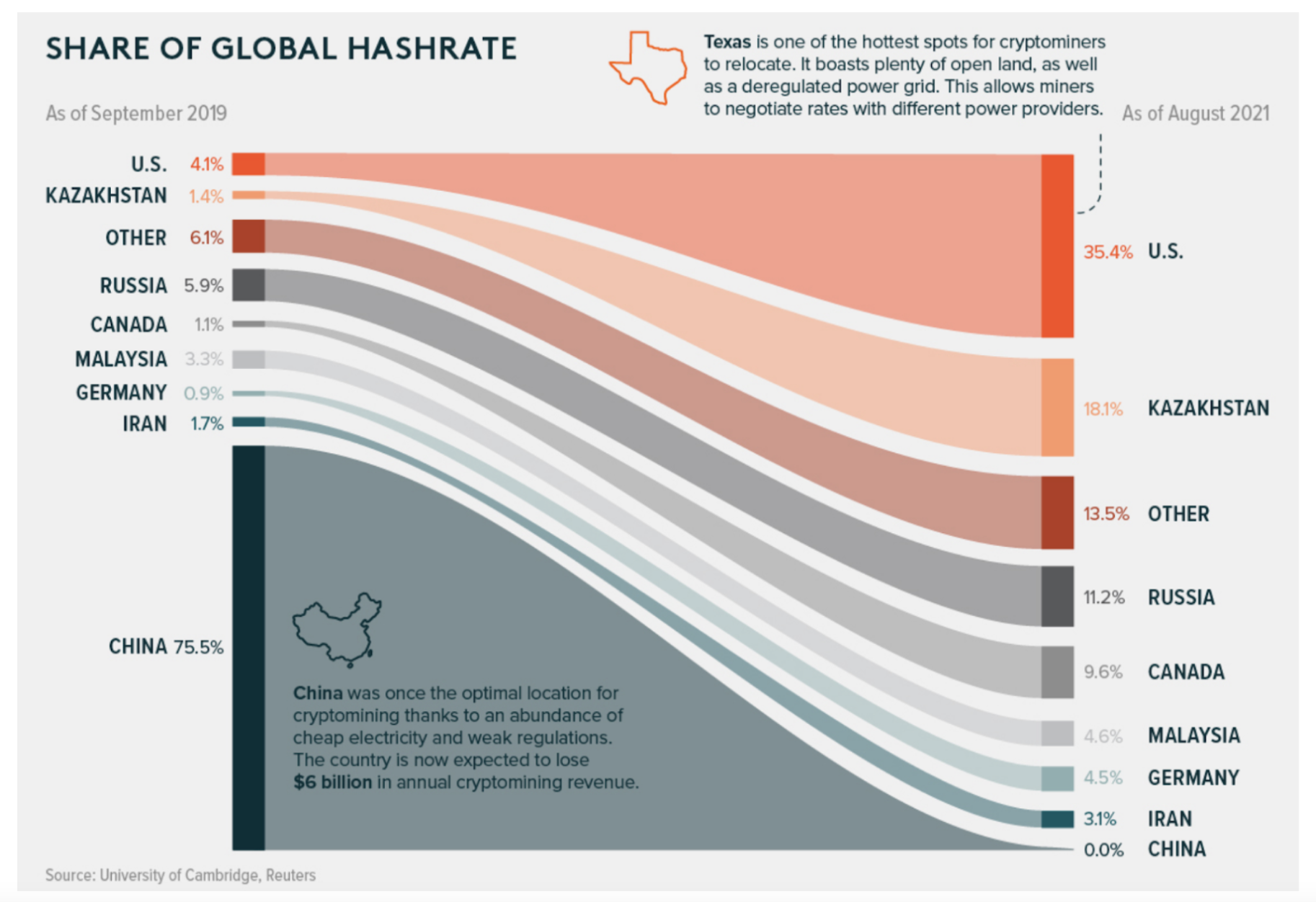In the summer of 2021, the Chinese government banned Bitcoin (BTC) mining and cited the typical concerns of harmful environmental effects and money laundering. Now, the Chinese government is working toward establishing its own digital yuan currency. This raises the question as to whether the original reasoning was merely a Trojan horse.
This ban could easily have been a huge blow to Bitcoin’s momentum. After all, close to 75% of all Bitcoin mining had been conducted in China by late 2019, according to Cambridge Alternative Finance Benchmarks. If the network teetered under the weight of China’s nationwide ban, other governments might have begun to think that Bitcoin could be defeated after all.
China’s ban was Bitcoin’s stress test
For a brief period, the ban worked as intended — by the end of June 2021, the Bitcoin network’s hash rate had dropped to 57.47 exahashes per second (EH/s), down by a few multiples. However, the hash rate rebounded to 193.64 EH/s by December 2021 and by February 2022, it reached an all-time high of 248.11 EH/s.
The entire ordeal was a test that Bitcoin passed with flying colors: Banning Bitcoin mining proved as effective as the Prohibition era was at killing drinking culture in the United States.
In early 2022, the obvious explanation for the hash rate recovery was that miners who had set up shop in China had simply fled to the Western Hemisphere. There was plenty of evidence that seemed to support this hypothesis — primarily that the United States’ share of the global hash rate exploded from 4.1% in late 2019 to 35.4% in August 2021.

The ban created a decentralized black market
However, the so-called “great migration” may not have been the only unintended consequence of China’s ban. As of May 2022, miners in China accounted for 22% of the global hash rate — a figure that is not as dominant as before, but no small slice of the pie, either.
As the Cambridge Centre for Alternative Finance reports:
“It is probable that a non-trivial share of Chinese miners quickly adapted to the new circumstances and continued operating covertly while hiding their tracks using foreign proxy services to deflect attention and scrutiny.”
Indeed, it’s likely that there is now a massive black market of Bitcoin mining in China.
Try as they might, one of the most authoritarian regimes on the planet cannot prevent its citizens from mining Bitcoin. In economic terms, the potential benefits to the China-based miners outweigh the costs associated with getting caught red-handed.
Despite the concern and skepticism that “experts” broadcast about Bitcoin, miners in China value the activity so much that they’re willing to risk breaking the law to get their hands on the future global reserve asset.
International competition for miners rises
Despite China’s black market surge, there is no doubt that the United States’ economy benefited from China’s ban. Just outside Kearney, Nebraska, a company called Compute North runs one of the United States’ largest data centers for cryptocurrency mining. Around the time of China’s ban, the company received a deluge of calls from operations that were trying to move their mining equipment from China into the United States.
Compute North welcomed its new partners with open arms. “We doubled in size,” said their lead technician. “We were busy nonstop for the whole summer. […] And there’s just continuing more and more demand all the time.”
Other towns, such as Rockdale, Texas, and Massena, New York, are also witnessing growth in their cryptocurrency mining ecosystems.
All of this migration could cause a vicious cycle for China and a virtuous cycle for the United States, which means that all sorts of other Bitcoin-related opportunities shift from China to the United States as well. Lamont Black, finance professor at DePaul University, believes that the recent influx of Bitcoin mining into America could bolster the country’s broader blockchain economy.
And that logic works both ways — to the extent that Bitcoin miners are leaving China, then ancillary Bitcoin activities will travel along with them.
Although fleeing miners considered countries other than the United States, it seems that miners prefer America because of its relatively robust respect for property rights. One miner migrating from China said, “Maybe the governments [of countries such as Russia or Kazakhstan] are not only shutting down the operation, but they also take […] all your machines. You might lose everything, so the United States is a safe choice.”
The takeaway for world governments
This black market phenomenon should be a lesson to Western politicians: If the Chinese government can’t ban Bitcoin mining out of existence, neither can you.
As the United States forges ahead in studying the regulatory implications of the industry, traditional financial institutions are closely monitoring its movements. Retail and institutional investors are also paying close attention to the market swings as they battle inflation at home. At this point, trying to put the toothpaste back in the tube is nothing but a waste of energy. Bitcoin mining is not going away.
The United States and other world leaders must learn from the mistakes of others so that they don’t have to repeat them. China wasted its efforts so that others don’t have to.
Disclaimer. Valideapp does not endorse any content of product on this page. While we aim at providing you all important information that we could obtain, readers should do their own research before taking any actions related to the company and carry full responsibility for their decisions, nor this article can be considered as an investment advice.
William Szamosszegi is the CEO and founder of Sazmining, the world’s first clean energy Bitcoin mining platform for retail customers. He is also the host of the Sazmining podcast and as a Bitcoin evangelist, Will is committed to improving humanity’s relationship with time, money and energy. Will is the recipient of Bucknell’s venture grant, a finalist in SXSW’s Digital Entrepreneurship Tournament, a Forbes Fellow and a regular speaker at Bitcoin mining conferences.



